| One of
the the first persons show visitors will look up
is Melbourne's Michael Gilmour (in fact
days before the show started, Michael welcomed
20 early arrivals to an Australian barbecue
cookout at his house). In his many travels the
personable Aussie who writes |
|
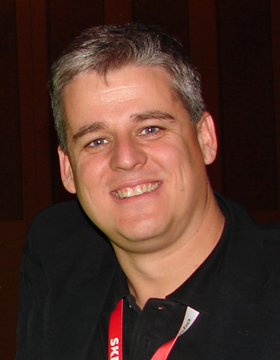
Michael
Gilmour |
WhizzbangsBlog has been a
great ambassador for
his nation as well as for the domain industry at
large. He was already on our short list of
potential Cover Story subjects and
this month was clearly the perfect time to tell
his story. In many
ways, Gilmour's journey through life has
been the quintessential boom
to bust to boom again saga that serial
entrepreneurs so closely identify with. After
working hard his whole life he was worth millions
only to suddenly find himself, due to
circumstances beyond his control, flat broke
almost overnight. In 2003 he took his last $100
and bought a domain name. Five short
years later, Gilmour is one of the most
successful people in an industry that is know
for amazing success stories. We'll tell
you about the influences that shaped his life,
the accomplishments that propelled him to great
success and how he managed to bounce back and
fly higher than ever before after turbulent
financial weather nearly grounded him for good. |
Gilmour was born in Melbourne in 1966, the third
child of accomplished science teacher Ray Gilmour and
his wife Margaret. Ray quickly rose to the top of
his profession and authored a number of text books that
were used in Australian schools for many years.
|
| "Both my mum and dad were
real adventurers who never dodged a challenge or
a chance to experience something new,"
Gilmour said. "When I was just a year and a
half old my parents decided to move the entire
family from sunny
Australia
to freezing northern
Ontario
in Canada
. We lived in a tiny mining town called Manitouwadge
north of Lake
Superior
where my dad became the head of the science
department at the local public school."
(Hit the pause button) Somehow I knew
Gilmour's story would have some connection to
Canada. I'm beginning to wonder if there is a single
great domainer who doesn't have Canadian
roots! There is Frank
Schilling, Kevin
Ham, Gary Chernoff and a
seemingly endless list of others. Now here's
Michael Gilmour who lives on the opposite side
of the globe and he too has ties to the Great
White North. Must be something magical in
the water there! (Resume play). |
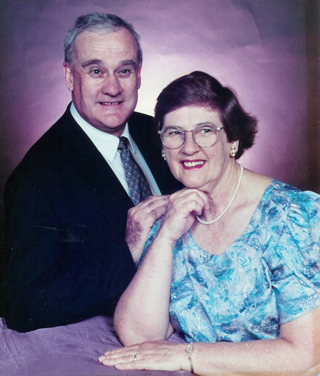
Michael's
parents, Ray & Margaret Gilmour |
|
Though his family
moved back to Australia when he was ten years
old, Gilmour never forgot his childhood home in
Canada. "I took my own family back to
Manitouwadge a couple of years ago and I
couldnít believe how small it is or how beautiful.
It was a great experience," Gilmour
recalled. "I think that my greatest
achievement was winning the snow shoe race in
grade two!"
"In grades 5 and 6 my teacher, Mrs.
Dowie, demanded higher and higher standards
and rather than becoming crushing it became a real
challenge and an inspiration. My parents
loved her standards of excellence as it was very
agreeable with their own ethos on life. I
remember telling my mum that I just received 96%
on a mathematics test and the first thing that
she asked me about was what happened to the
other 4%! Many people may think that this
is harsh but it was done in a good natured
manner. Itís the mistakes that teach us
not what we got right on a test."
|

Sarah,
Elise & Timothy Gilmour
Michael & wife Roselyn's
children |
"I find myself asking
my own kids exactly the same questions
as my mum did to me. I think that as
long as you do it in a good natured way
and balance it with a great amount of
encouragement then it can be really
inspirational," Gilmour said.
"My
parents both instilled into me a strong
sense of a moral compass that was always
grounded in an active involvement in a
local church. This really helped me
later in life when I was on the
receiving end of a few curve balls.
Iíve always received a tremendous
amount of encouragement in whatever I
did from both of them and |
| their ďcan
doĒ attitude has helped me push
through many of lifeís challenges. I
believe that this coupled with their
huge capacity to love and help those who
are in need have helped provide me with
a relatively balanced perspective on
life," Gilmour said. |
"I think that one
of the challenges that domain owners face is
managing that life/obsession with domains
balance.
Iíve said it a number of times before that
Iím amazed at how hard domainers work
for their passive incomes. My parents
have always worked really hard but they also
knew how to have a lot of fun and laugh a lot as
well." |
Like so many other people in this business, Gilmour
exhibited a very early interest in computers. His
started in grade 8, not long after his family had moved
back to Australia. "A good friend (who is now one
of my business partners) and I built a computer games
system we saw in an electronics magazine that was very
similar to ďpongĒ. I must admit it that it was
pretty exciting playing a computer game that didnít
cost quarters to play," Gilmour said.
|
"Every Saturday we used to
ride down to the local Tandy Electronics
store and try and program an old TRS-80.
I think that the manager of the store used to
take the attitude that a couple of kids on a
computer was a pretty good advertisement. Iíll
never forget the first time that we managed to
write a program that filled the whole screen in
with white pixels. I laugh at it now but back in
those days it was quite an achievement."
"At the end of Year 11 I managed to get a
holiday job filing thousands of files at a local
credit union for one hundred dollars a week. It
was the most mind numbing boring job you could ever
do but by the end of the holidays I managed to
get together enough money to buy my first
computer. It had 16K of RAM and I thought
to myself, ďHow could anyone ever use all
that?,Ē Gilmour laughed.
"I was hooked on computers and after high
school I went on and completed a bachelor of
science in electronics and computer science.
I canít say that I loved every minute of the
course but it did give me a qualification."
|
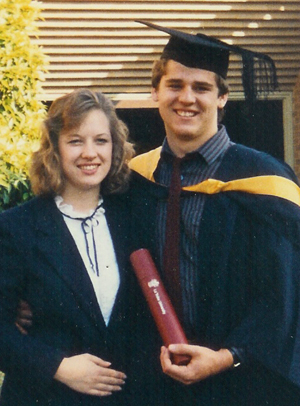
Michael
& wife Roselyn on his
college graduation day in 1987. |
Gilmour actually started his
business career long before he got his college degree.
"I started my first business with a friend of mine
when I was 17 years old," Gilmour said.
"We created a board game, raised funds to have it
manufactured and then distributed it to stores around
the country. It made its money back but it was never
likely to be a massive hit. In terms of teaching me
about business it was the best thing I could ever have
done though."
"Since I was always interested in games, during a
vacation I called up a local computer games company (Melbourne
House) and told them they should hire me.
Iíd researched the company and knew that they were a
global player and that some of their game titles were
the best available. After sitting down with the CEO for
about thirty minutes I ended up working with the team
that developed the game ďLord of the RingsĒ
on an old Amstrad Z80 computer. I then moved on
to a game called ďMugsyís RevengeĒ where I
coded the story board and had fun squeezing as much game
play as possible into a ZX Spectrum computer with
32K of RAM."
After college Gilmour returned to
the company to work on reverse engineering an early Nintendo
so they could program it. "We were tucked away in a
completely separate building and it felt like being part
of a black-ops team. My claim to fame was that I blew
up the first Nintendo in
Australia
and then cracking the code so that the company could
program the system," Gilmour said.
|
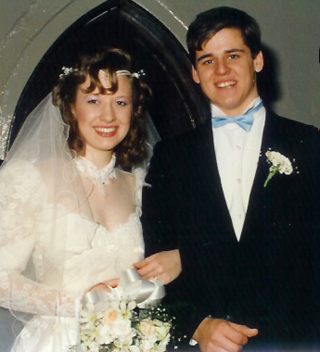
Michael
& Roselyn's Wedding Day |
"I have always been heavily
involved with computers through the years. Back
in the eighties I was running a bulletin board
system (BBS) and designing banner advertisements
out of ANSI characters. However I soon realized
that despite my love for computers that it was
really business and people that captivated
me. I left the games company and worked with my
brother in his music concert promotions business
developing marketing and distribution strategies
for the business. Sadly, he ended up losing his
house after a particularly bad concert tour went
under. But all is well now - heís an
incredibly successful businessman that owns a
flight simulator business."
"After getting married to my wonderful
wife, Roselyn I ended up riding the wave
of the desktop publishing revolution, wrote a
number of training courses and entered the
|
| professional
speaking circuit. I spoke at events all over
Australia
, New Zealand
and into Asia with a real highlight
being asked to speak at the World Marketing
Conference in
Bangkok
. It was a fantastic successful time that had
the severe downside of me being continuously
away from home," Gilmour recalled.
"Sometimes you have to make tough
decisions and I love my wife much more than my
career so after about 50 flights in 3 months I
completely abandoned the speaking circuit and
started a full time MBA program. This was
a fresh start on life and also a time to enjoy
my family while I studied," he said. |
"My MBA marketing study group had the choice to do an assignment about the
photocopy paper industry or one on the Internet. I
really pushed for the Internet but democracy won the day
and we ended up getting a high distinction by writing a
marketing assignment on photocopy paper. It did help
that one of my team worked for
Australia
ís largest manufacturer of photocopy paper so he had
all the data we needed," Gilmour smiled.
Though the paper was done, Gilmour
still wanted to investigate this exciting new
communications medium - the Internet. "Iím a firm
believer that if you want to understand something then
leap in the ďdeep endĒ so I founded an ISP in a back
room of my house," Gilmour said. "The crazy
thing was that it just started growing and I ended up
with about 50 modems buzzing away like the Starship
Enterprise
on steroids!"
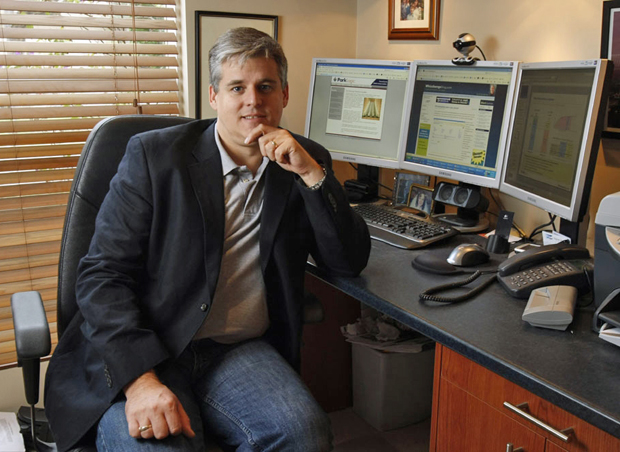
Gilmour
today - on the bridge of his Internet
"Enterprise"
"After my experiences with the
ISP I used the knowledge to raise a few million dollars
from the venture capital market to develop an innovative
online psychographic marketing technology. This ended up
being used by an immensely popular TV program for
broadcasting alert messages directly to peopleís PCs.
I was flying high!," Gilmour exclaimed.
But then, as quickly as that
business had taken off, it all went south. "I
woke up one morning to find out that due to an
international merger my major shareholder was unable to
fulfill their obligations of additional investment.
Thereís nothing quite like having 22 staff members and
no money in the bank to immediately get your
attention. In the end we had no choice and the business
had to be closed. Almost overnight Iíd gone from being
worth millions to having lost nearly everything. It
was not a fun time," Gilmour said.
"So there I was sitting at
home with no job and wondering what I was going to do.
Back in 2003 my cousin and I used to talk nearly every
night about the Internet and I remember after one of
these conversations at about 2 o'clock in the morning I ended
up investing $100 in my first domain name. That
$100 was literally all my wife and I had left.
The next morning after Iíd explained what Iíd just
done my wife was so incredibly gracious that I will
always be in awe of her. The crazy thing was that the
next day the domain earned fifty cents. I was over
the moon! Iíd hit the jackpot! What I saw
was the fact that Iíd earned 50 cents with no
effort after the initial investment," Gilmour
said.
|
"We ended up selling
as much of our stuff as possible to invest in
domains (which wasnít much). I even used to
sell domains at $1 per overture point
just to raise cash to buy more domains. The
magical point came when our living expenses
were covered and we just kept on reinvesting
to grow the cashflow. Iíve always been pretty
analytical and it didnít take me long to
realize that an absolutely critical aspect of
domain investment was optimization. Like
everyone I initially had huge spreadsheets but
it wasnít long before I started developing a system
for monitoring my own portfolio of domains."
I was asked to speak on
optimization at the first
DomainFest Global conference in
Hollywood
a couple of years ago and I shared with the
attendees some of my thoughts. I assumed
everyone was optimizing and quickly realized
that not many were really developing methodical
systems for getting the most from their domains
across time. From this experience I |
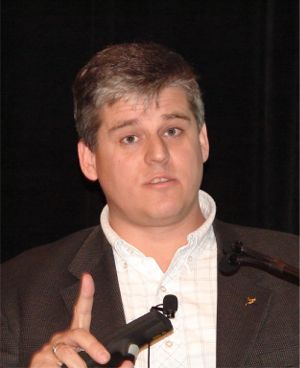
Gilmour
speaking at the first DomainFest
Global conference in Hollywood, CA
(February 2007) |
| realized that I
couldnít build a new optimization business
entirely by myself so I approached two highly
experienced businessmen who had particularly
unique skill sets that complimented my own and
we founded ParkLogic. |
"With all of the fraud in the
domain industry we have taken a particularly hard line
on who we allow into the ParkLogic network. We typically
work with the larger players in the industry and rely a
lot on our own personal relationships with domainers to
help maintain the traffic quality. This has helped us
enormously in eliminating fraud from our network.
Quality domainers typically bring quality traffic,"
Gilmour said.
"At times, managing
ParkLogicís growth has been a challenge as itís
always easy to grow until you explode rather than
sensibly manage growth. Weíve managed to do this and
even during these turbulent times weíve manage to
provide some positive results for customers."
|

|
Given Gilmour's expertise with
PPC we asked for his take on the big revenue decline
we have seen in that category and what he thought about
the the prospects for a rebound. "One of the
reasons why I think that the PPC model is so great is
that at the moment it is the only scalable model
available that enables domainers to effectively monetize
their traffic," Gilmour said.
"Even though it is scalable I personally believe
that it was only a matter of time before the PPC bubble
burst and we saw a downtrend in EPC (earnings per
click) rates. About twelve months ago I presented a
slide at a conference that predicted the current
recession that weíre all now experiencing. I recently
wrote an eleven article series at Whizzbangsblog.com
on it which can be viewed here
(free registration required to read)."
"In summary I believe that the PPC market has
declined predominantly because there is no
|
| need to keep
on paying higher values for traffic in a market that has
no transparency and no standards. Both
major advertising partners (Google and Yahoo)
are supporting incredible company valuations that
require them to produce outstanding figures quarter on
quarter or they get clobbered by Wall Street.
This coupled with the global downturn would inevitably
flow into lower PPC prices," Gilmour noted. |
"Even though globally it is predicted that
online advertising will continue to increase I donít
believe that it will increase at the same rate that it
was previously. On the other hand the number of users
online has still continued to accelerate. These users
will generate more traffic for relatively the same
advertising dollars and this is what is contributing to
lower PPC rates."
"What we are seeing in the
marketplace is a feeling of fear coming in and
many domainers are thinking that they see that the grass
is greener over at a different parking company. In
reality if you want to maximize your revenue you need to
use them all and have sophisticated systems and
people to manage it Ė hence ParkLogic."
"I think that there are a few
things that can be done to reduce the length of
time that the domain industry experiences a recession.
The first is the introduction of standards that will
provide both advertisers and investors secure metrics
around what they are investing in. In particular, this
should help advertisers understand the domain channel a
lot better and enable them to compare uniques vs.
uniques and clicks vs. clicks," Gilmour said.
|
Of course many domainers are
looking beyond parking all together and looking into
domain development. That solution is one that
Gilmour believes is not quite ready for prime time - at
least not on a large scale basis.
"As Iíve mentioned already I
believe that the fundamental problem with development is
that you can't do it as a scalable solution across
thousands of domains. Many people have tried and many
people have failed. The advantage that PPC generated
revenue has is that it is scalable. Given that most
domain owners have built large portfolios of domains
building them all out isnít a viable solution. This
will mean that PPC is likely to be here for a while yet,"
Gilmour said.
"On the other hand selecting a
few prime domains that you are passionate
about and developing them as stand alone businesses
could be viable. Notice that I said a few (i.e., maximum
of three) and not hundreds. I personally have
my blog
and Iím just finalizing Downwind.com.au
for the Australian aviation market. I really enjoy Whizzbangsblog.com
and since becoming a pilot I love flying. These are two
great personal reasons to develop a site."
|

|
"The blog does take some time
but I must admit it that I really enjoy writing the
articles and talking with other domainers. I always
believe that business isnít just money in the bank but
the relationships that you make alone the
journey. My blog allows me to develop and extend those
relationships."
"Iíve also tried to develop
a domain wiki which contains a lot of information
on the domain industry. I would welcome anyone and
everyone to contribute to the wiki so that we can
capture the knowledge and history of this incredible
industry that we are all operating in."
"I think that many people try
and solve the development conundrum from a technological
perspective. I personally believe that it has less to do
with technology and more to do with management focus,
real content, real products and real customers. These
are all the little nasty things that we can all ignore
in the PPC world," Gilmour noted.
"I still believe that there
will be companies that embark on developing scalable
developmental solutions for domains and they will claim
that theyíve solved the problems of the past. I think
thatís great! Iíll do a test with a few of my
domains and compare the results to what Iím getting at
the moment. One of the nice things about being a
domainer is that it costs us very little to do a test."
|

|
Domain owners are facing many
challenges today, the most recent being the state of Kentucky's
attempt to claim jurisdiction over domain names. Gilmour
has been successful in organizing Australia's Internet
entrepreneurs so we asked him how he thought domain
owners worldwide can best respond to efforts aimed at
changing laws or policy in a way that will make it
easier for covetous parties to separate current owners
from their assets.
"In order to tackle an issue
like
Kentucky
it requires a coordinated effort from a recognized
body that represents the entire industry. In
order to have a body that is recognized you must put
aside your own personal prejudices and work
|
|
alongside people that may be your bitterest competitors.
This also means that because you act a 100 million miles
an hour it doesnít mean that the association will.
Working with people and not against them is the key
to long-term prosperity for the whole industry,"
Gilmour said.
|
"For example, when I was the
vice-chairman of the Internet Industry Association (IIA)
in Australia we had the CEOs of the major internet
providers, MSN, Yahoo, etc. all sitting
around the board table working together for the
good of the industry. The IIA was respected by the
government and industry because we could say that we
represented 98% of the Internet users in
Australia
and we ended up having huge successes at an
industry and legislative level."
"Compare this to the state of
the
ICA
(Internet
Commerce Association). The
ICA
was setup to represent domain owners and the domain
industry. In my opinion it struggles along simply
because people arenít willing to put aside their
differences and embrace the industry for the
ultimate benefit of their domain assets," Gilmour
said.
 |
"The
ICA
is the body that should be tackling the
Kentucky
issue and they should be the ones that say, ďIím
from the
ICA
and I represent 100 million people in the world that
visit our members websites each month." Let me
assure you that this will get a politician's
attention. Boycotts only get the other party digging in
their heels while persuasive assertiveness from a
powerful position with dedicated members can be
immensely effective."
|
"This brings up another point.
If the
ICA
and the domain industry are to be effective then it must
lose the
U.S.
centric focus. I canít remember who it was that told
me this but they indicated that over 40% of
attendees that go to domain conferences in the
USA
are internationally based. As an aside, itís
strange that the prizes offered by exhibitors are often
TVs, Playstations or other electrical goods that are useless
to the international contingent. The ICA needs to
embrace the whole domain industry and as an
industry we need to view ourselves as a part of a global
community that needs a central body to fight
some of the fights that we canít be in ourselves,"
Gilmour said.
While the domain industry still has
issues that need to be worked out, few people in it
would change places with anyone else. It continues to
draw newcomers week after week. Gilmour closed with some
advice for them.
|
"The best thing about this
business is that generally speaking the people are incredibly
helpful. If youíre new then just ask the dumb
questions as youíll be surprised that youíll be
inundated with help, good advice and maybe even a
possible deal or two," Gilmour said.
"The flip side of this is that
with every group of people there are always a few sharks
that can spoil things. Just be careful and as a
general rule listen to the people who donít want
anything in return."
"So often I hear of a new
investor dreaming up domains and registering them in the
belief that money will fall from heaven because they now
own these things called domains. A few lessons Iíve
learned is to always ask, ďWhy does traffic go to a
domain?Ē, ďWhere does the traffic come from?Ē,
ďWill the traffic continue?Ē If you ask these
three simple questions then youíre more than
likely to protect yourself from a financial downfall
and earn a financial windfall," Gilmour
concluded.
|
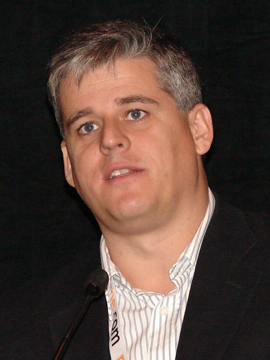
Michael
Gilmour |
That's the voice of experience
speaking and it's worth listening to. As author Laurence
Peter once said "There is only one thing more
painful than learning from experience, and that is not
learning from experience." |












